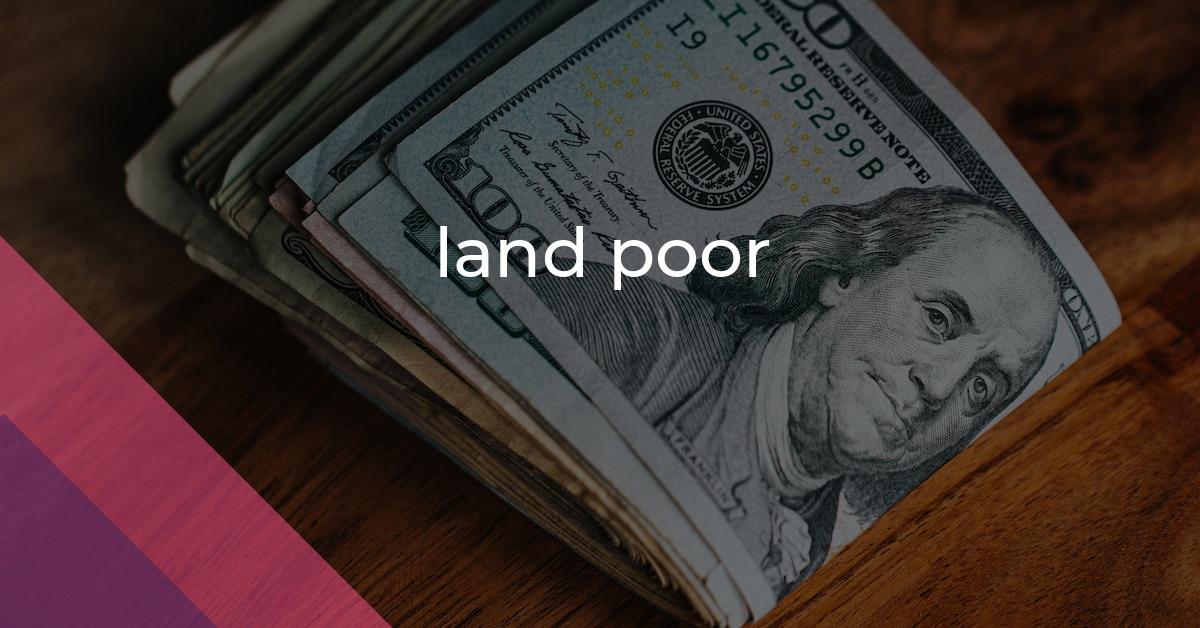land poor: Idiom Meaning and Origin
What does ‘land poor’ mean?
The idiom "land poor" means to be wealthy in terms of owning land, but lacking the necessary funds or resources to maintain or develop it, resulting in financial difficulty.

Idiom Explorer
The idiom "leave someone high and dry" means to abandon or forsake someone in a difficult or helpless situation without any support or assistance.
The idiom "lay of the land" refers to understanding or becoming familiar with a situation or environment. It implies gaining knowledge about the current state, conditions, or dynamics of a particular situation or place.
The idiom "land on one's feet" means to recover or be successful after a difficult or challenging situation. It suggests being able to adapt and find a positive outcome despite the circumstances.
The idiom "land of opportunity" refers to a place or situation where there are many opportunities for success, especially in terms of economic and social advancement.
The idiom "in the money" means to be in a financially successful or prosperous situation.
The idiom "in the hole" means to be in debt or in a difficult financial situation. It is often used to describe a person or a company that owes money and is struggling to repay it.
Meaning: Someone who spends a large portion of their income on housing expenses, leaving little money for other expenses or savings.
"High and dry" is an idiom that means to be left in a difficult or helpless situation, especially without any assistance or support.
The idiom "have more money than God" means to be extremely rich or wealthy beyond imagination.
Hidden Burden of Land Ownership
The concept of being "land poor" holds a specific meaning in the world of real estate and property ownership. It refers to a situation where someone or an organization owns a significant amount of land but lacks the financial resources to maintain or develop it. In other words, the land itself is valuable, but the owner struggles to utilize its potential due to financial constraints.
The idiom "land poor" is closely associated with the economic and social factors surrounding land ownership. While land is considered a valuable asset that can appreciate over time, it also comes with costs and responsibilities. These include property taxes, maintenance, and development expenses. If someone acquires a large amount of land without sufficient financial resources, they may find themselves unable to maximize its potential or meet these obligations.
Being land poor can have different implications depending on the context. For example, in an agricultural setting, a farmer may own a significant amount of land but be unable to afford the equipment, labor, or supplies necessary for cultivation. Despite possessing vast agricultural potential, their financial limitations hinder their ability to effectively use the land.
In real estate development, a person or company may acquire a substantial portion of land with the intent of building or developing on it. However, if they lack the necessary capital or financing, the land remains undeveloped or underutilized, making them land poor. This often occurs when property values rise rapidly, resulting in inflated land prices that surpass the buyer's financial capabilities.
The term "land poor" is primarily used in professional contexts such as real estate, agriculture, and property management. It allows individuals within these fields to succinctly describe the challenges faced by landowners and investors in such circumstances. By using this idiom, professionals can quickly convey the complex situation where valuable land ownership is hindered by financial limitations.
Additionally, there are two related idioms that further emphasize the concept of being financially constrained due to property ownership: "house poor" and "dirt-poor".
The idiom "house poor" refers to a situation where the majority of someone's income is spent on their residential property, leaving them with little money for other expenses. It implies that despite owning a house, the owner's financial situation is strained, as a significant portion of their income goes towards mortgage payments, property taxes, and maintenance costs.
The idiom "dirt-poor" is often used to describe extreme poverty or destitution. It signifies a situation where someone has no financial resources or assets, to the extent that they don't even have enough money to buy basic necessities. The term "dirt-poor" uses the word "dirt" as a metaphor for complete poverty, emphasizing the lack of financial means.
Overall, the idiom "land poor" concisely captures the predicament of individuals or entities who own substantial amounts of land but lack the financial means to fully utilize or develop it. Whether in agricultural or real estate contexts, this phrase highlights the discrepancy between the inherent value of the land and the financial constraints that impede its optimal use. It serves as a reminder of the complexities and challenges associated with land ownership, sparking discussions about potential solutions and avenues for improvement.
Example usage
Examples of how the idiom "land poor" can be used in a sentence:
- After investing all their savings in a large piece of land, they found themselves land poor and unable to afford the necessary renovations for their new property.
- The wealthy investor bought multiple properties but became land poor when the real estate market crashed, leaving him with empty parcels that were difficult to sell.
- Despite inheriting a vast estate, their family's lack of liquid assets meant they were land poor and struggled to maintain the property.
More "Housing" idioms



